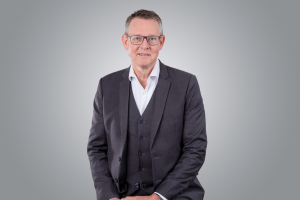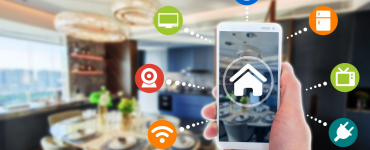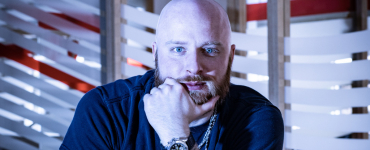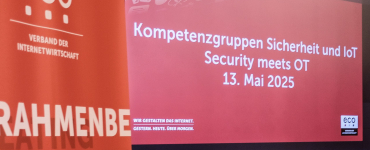“Now it’s about making the IoT accessible to everyone.”
eco – Association of the Internet Industry is delighted to welcome Dr. Michael Opitz as the new Leader of the Internet of Things Competence Group (CG). He heads the TIME industry group (Telecommunications, Information Technology, Media & Electronics) in Germany and Switzerland at the strategy consultancy Arthur D. Little. He has more than 25 years of experience in managing digital transformation and reveals in this interview how he wants to drive the industry forward in the future together with the Leader of the eco IoT Competence Group Giovanni Coppa.
The Internet of Things offers enormous potential for the smart city, mobility and intelligent living spaces. What excites you most about the technology? Is there a future scenario that motivates you to get involved in the industry every day?
I think the question gets to the heart of the matter very aptly, and it is precisely this thematic diversity in which the Internet of Things (IoT) is already accompanying, simplifying and helping to shape our lives today – and especially in the future. It is this future potential that has excited me about the topic for years. If you ask me about a future scenario for the IoT, I see one aspect in particular: in the coming years, we will finally see the long-promised added value of this technology realised. After all, we have laid the technological foundations in recent years. Now it’s about making the IoT accessible to everyone and reaping the rewards of this groundwork. A selected realistic application scenario is, for example, the predictive maintenance of public transport systems through the use of IoT: it can reduce delays, increase safety and reduce costs. We are already seeing initial approaches in cities such as Zurich.
What role does the Industrial Internet of Things (IIoT) play in the transformation of the industrial sector?
The Industrial Internet of Things is a key driver for automation and increased efficiency. It enables systems to be monitored in real time, reduces down times and lowers costs. A few examples: Bosch uses IIoT to reduce maintenance costs and energy consumption. BMW uses sensor data to optimise its assembly lines. Schaeffler relies on condition monitoring, i.e. the continuous condition monitoring of machines using sensors to measure vibrations or temperature, for example. This allows impending failures to be recognised at an early stage and avoided in a targeted manner. Fig., in turn, integrates IIoT into its robotics solutions in order to carry out remote diagnostics and performance optimisation. I think it’s becoming very clear: IIoT applications increase productivity and create the basis for flexible, data-based processes. The further use of AI will once again significantly increase the potential of IIoT.
How strategically has data from IoT devices been collected and processed so far? How can we secure this data source?
Leading international companies are integrating real-time data from IoT sensors and using artificial intelligence (AI technology) to gain actionable insights. Security remains a key concern: End-to-end encryption and Zero-Trust Architecture have proven very successful here so far. A successful example of secure and strategic data utilisation is Siemens’ MindSphere – a solution that collects essential data from connected products and systems and prepares it for processing using analytics and AI at the edge and in the cloud. However, it is also clear that there is still a lot of room for improvement when it comes to the widespread use of IoT in business.
What do you currently see as the biggest challenges for IoT companies in Germany – and across Europe?
We are currently facing several challenges. There is still a great deal of regulatory and technological fragmentation. A wide variety of European regulations and a lack of interoperability in the area of hardware and software solutions have slowed down the full potential of IoT so far. In addition, there is a noticeable shortage of specialists with in-depth IoT expertise and competent handling of data. In my experience, start-ups dealing with smart energy solutions in particular are already affected by this. There is definitely a need for action here – in education, politics and business.
How would you like to use your experience and work as the new competence group leader to help solve this?
As the new Leader of the IoT Competence Group, I am particularly interested in bringing together the various stakeholder groups in the German Internet industry and beyond. Together, we can realise the full potential of this exciting technology!
What is something close to your heart that you really want to promote at the association?
I am passionate about showing eco members the economic opportunities and possibilities of the IoT. In particular, I want to support companies, the public sector and other stakeholders in taking their room for manoeuvre to a new level through the use of IoT. I am convinced that I can contribute my experience from a large number of international projects in the IoT ecosystem to the benefit of the association and its members.
Join eco’s Internet of Things (IoT) Competence Group!
Interested in regularly exchanging ideas in the eco IoT Competence Group and solving industry-relevant challenges together? Get in touch now.




